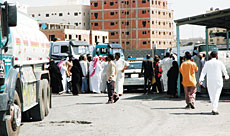JEDDAH: Yesterday’s meeting of the Jeddah City Council was dominated by one thing — the summertime water shortages faced by city residents.
Addressing this perennial issue, the local head of the National Water Company (NWC), Abdullah Al-Assaf, assured the council that by July the output through the city’s system of underground pipes would be increased so that delivery would come every six days.
“Jeddah’s water distribution is still in improvement process,” he told the council, while outlining NWC’s efforts to fix leaks in water mains. “The National Water Company has installed 75 meters to measure water flow and 200 pressure monitors that are linked to the control and monitor room program for better monitoring of network performance.”
Currently the city’s tap water distribution system is haphazard. Depending on what part of the city you live in, water arrives through the mains at varying intervals of days or weeks and the flow remains open for a number of hours. Some residents complain of water not coming for long stretches of time. Other neighborhoods are luckier; they receive piped water every few days. It is within this periodic window of opportunity that building water reservoirs can be replenished. If water is used up before the next piped delivery, building owners must arrange for truck delivery.
“Our summer strategy is to improve the network of water distribution and reduce the period of interruptions to the supply in the metro area, giving each customer the required amount of water,” said Al-Assaf.
If this happens residents in outlying areas of the city would have reason to rejoice: At present, some of these areas go weeks without piped potable water.
The NWC has divided the municipality into 51 distribution areas. Four areas will have undergone improvement of network performance and pressure control by the end of next month.
Also contributing to the hopeful forecast is increased output from the Shuaiba-3 desalination plant by 180,000 cubic meters per day and from Khulais valley by 10,000 cubic meters per day.
Another summertime worry is the long lines that develop at Jeddah’s water filling stations, known as the Ashiab. Last summer Arab News interviewed residents who waited up to 10 hours, tickets in hand, simply to place an order for a water truck at the city’s main filling station in Al-Faisaliya district. The queues and hassles even caused water scalpers to linger just outside the distribution center willing to deliver an already-filled truck to the highest bidder.
Al-Assaf said preventive maintenance and improvements to the network would help the NWC increase output to the distribution center to 235,000 cubic meters per day. During Ramadan the output will be increased to 250,000 cubic meters per day. At least some of this output will be consumed by the natural demographic growth of the population: Al-Assaf said the Al-Faisaliya filling station alone saw an increase in customers by 58 percent year-to-year. It is hoped that increasing the output through city pipes will ease pressure on the center.
Al-Assaf also announced that the NWC now has a phone number to call to order tanker truck delivery in Jeddah: 800-441-1110. He is urging older residents and women to use that number instead of going to the distribution centers.


